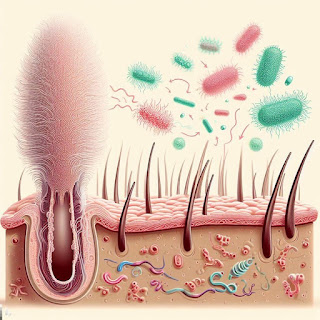In a study published this month in the Journal of Dermatological Science, Edelkamp and a team of researchers have unveiled a novel approach to managing the human hair follicle microbiome. The key player is a synthetic odorant that mimics the scent of sandalwood, known as Sandalore®.
The study's foundation lies in the discovery that human scalp hair follicles (HFs) possess olfactory receptors, which enable them to engage in chemosensation. Specifically, activation of olfactory receptor family 2 subfamily AT member 4 (OR2AT4).
One of the findings was the role of Sandalore® in up-regulating the expression of dermcidin (DCD) within the hair follicles. Previously believed to be exclusively produced by sweat and sebaceous glands, DCD is a potent antimicrobial peptide. The study revealed that synthetic odorant treatment triggered the production of DCD within the hair follicles.
To thoroughly understand the implications of this discovery, the researchers compared DCD expression between fresh-frozen scalp biopsies and microdissected, full-length scalp HFs. These HFs were organ-cultured under various conditions, including the presence or absence of Sandalore®, antibiotics, and the competitive OR2AT4 antagonist, Phenirat®.
Sandalore®-conditioned medium, with increased DCD content, was found to favor the growth of beneficial bacteria, such as Staphylococcus epidermidis and Malassezia restricta, while simultaneously exhibiting antimicrobial activity against Cutibacterium acnes.
The study opens doors for further exploration into using cosmetic odorants in the management of folliculitis and dysbiosis-associated hair diseases.
REFERENCE
Edelkamp J, Lousada MB, Pinto D, Chéret J, Calabrese FM, Jiménez F, Erdmann H, Wessel J, Phillip B, Angelis M, Rinaldi F, Bertolini M, Paus R. Management of the human hair follicle microbiome by a synthetic odorant. J Dermatol Sci. 2023 Oct 17:S0923-1811(23)00221-9. doi: 10.1016/j.jdermsci.2023.09.006. Epub ahead of print. PMID: 37858476.
